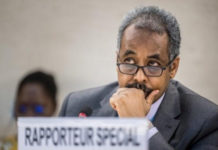Hamodia: High Court Chief Justice to Get Some New Neighbors – Illegal African Migrants – 29 August
- Israeli newspaper Hamodia paints a very negative picture of efforts by the Bereishis Organisation to help Eritrean asylum seekers in Tev Aviv.
- Yehoshua Hame’iri, head of the Bereishis Organization, explains that “the objective [of purchasing two apartments in a Tel Aviv suburb] is to house Eritreans who are working in the area in those apartments. The fund decided to purchase the apartments so there could be no question as to its right to allow anyone it wants to live there.” A third apartment is currently under contract, he said.
- The apartments are situated in the Ramat Hachayal neighborhood of Tel Aviv, adjacent to the home of High Court chief justice Esther Hayout.
- Earlier this year, Israel issued deportation orders leaving African migrants seeking asylum to face an impossible choice between deportation or indefinite detention.
Africanews.com – Eritrea database helped Ethiopian journalist find ‘lost’ father after years – 29 August
- “Upon announcement of the peace agreement between Eritrea and Ethiopia, Samson Berhane, an Ethiopian national, boarded the fifth flight connecting Ethiopia to Eritrea in search of his father, who he thought might have been dead.”
- “Eritrea’s national database which kept records of all its citizens turned out to be crucial in his search, and many layers of Eritrean administration have been very helpful to help Samson trace the movements of his dad.”
- “Samson’s story is one of hundreds of nationals who had the almost unbelievable incidence of re-establishing long lost connections.”
Foreign Policy – Life in Eritrea’s News Desert – 28 August
- Foreign Policy reports on Seyoum Tsehaye’s journalism in Eritrea.
- Throughout the 1990s, Eritrea enjoyed a relatively free press. Journalists were comfortable questioning the government, and there was plenty of room for dissenting political opinion. Activists and academics often stood up in open meetings to challenge the president
- In 2001, Foreign Policy reports, the Eritrean government started arresting prominent journalists and banned local independent news organizations. The crackdown was sudden, forceful, and sent an unambiguous message about how the government would deal with its critics.
- At least seven of the journalists imprisoned in 2001 have since died in detention, according to Reporters Without Borders, a media advocacy group. Four of their colleagues may still be alive, but their status is impossible to confirm.
- The elimination of the free press enabled the regime to introduce new restrictions on average citizens that might otherwise have been protested.
The Guardian: ‘Asmara is a jewel’: but can Eritrea’s modernising capital retain its charm? – 28 August
- The Guardian depicts Asmara as a ‘jewel’ of a city, and emphasises the chance for development granted by the peace agreement between Eritrea and Ethiopia on 8th July.
- Nothing has been built in Asmara since the turn of the millennium. A few iconic buildings such as the Fiat Tagliero service station, a reminder of the Italian Era Futurism, remain in the city.
- The peace agreement gives hope for a limit of the military state which should go along with a transfer of funding priorities, and a more independent approach to construction is expected.
- The city has strict heritage laws and the first revisions to its building code since 1938. A new masterplan has been designed, which will allow for development in the city centre – making use of the many empty plots and old factory spaces – but under tough guidelines. High-rises will be permitted in districts outside the historic centre. A ring road is being built so that heavy trucks are kept out.
Emerging Europe: Albanian minister explains decision to welcome Eritrean refugees – 27 August
- Emerging Europe reports on the decision of Albania to take in 20 Eritrean migrants from an Italian coast guard ship that rescued them on Aug 16.
- According to human rights lawyers, Italy’s Interior Minister Matteo Salvini, who ordered the asylum seekers to be kept aboard the vessel, is breaking international laws. Salvini is a strongly anti-immigration politician who has vowed to stop refugees from entering Italy. Since June, he has blocked a number of humanitarian ships from bringing people rescued from the sea to Italy.
- Emerging Europe reports on an interview with the BBC, the Albanian Prime Minister for Europe and Foreign Affairs, Ditmir Bushati, said that the decision to help Eritrean refugees ‘coincides with a position Albania took four years ago, when the refugee crisis started, that all countries in Europe, regardless whether they are part of the EU or not, should contribute somehow to the migration crisis, because this is a European crisis and requires a European response.’
- Emerging Europe reminded its readers that Eritrea is one of the world’s most repressive states, where most adults are forcibly enrolled into the army for an indefinite period which can often last for decades.
Africanews.com Germany backs Ethiopia-Eritrea deal as diplomat visits Asmara, Addis – 25 August
- Germany is the latest European nation to commit to supporting the historic July 2018 Ethiopia – Eritrea peace deal.
- The country’s Minister of International Cooperation, Gerd Muller, delivered the German assurance during a meeting with leaders of both countries.
- Muller and his delegation met with Eritrean President Isaias Afwerki on Friday during which event he expressed support to the Eritrea-Ethiopia peace agreement.







